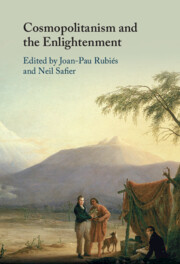Book contents
- Cosmopolitanism and the Enlightenment
- Cosmopolitanism and the Enlightenment
- Copyright page
- Dedication
- Contents
- Figures
- Contributors
- Preface
- Acknowledgments
- Introduction
- 1 Enlightenment Cosmopolitanism in Perspective
- 2 The Cosmopolitan Paradox
- 3 Diderot’s Conjectural History and the History of “Monstrous Nature”
- 4 Geographies of Cosmopolitanism
- 5 The Imperial, Global (Cosmopolitan) Dimensions of Nonelite Colonial Scribal Cultures in the Early Modern Iberian Atlantic
- 6 Gendered Cosmopolitanism?
- 7 Cosmopolitanism and the Creation of Patriotic Identities in the European Enlightenment
- 8 A Cosmopolitanism of Countervailing Powers
- 9 Cosmopolitanism and Civil War
- Afterword
- Index
4 - Geographies of Cosmopolitanism
Cartography, Natural History, and the Spaces of Knowledge in the Long Eighteenth Century
Published online by Cambridge University Press: 16 March 2023
- Cosmopolitanism and the Enlightenment
- Cosmopolitanism and the Enlightenment
- Copyright page
- Dedication
- Contents
- Figures
- Contributors
- Preface
- Acknowledgments
- Introduction
- 1 Enlightenment Cosmopolitanism in Perspective
- 2 The Cosmopolitan Paradox
- 3 Diderot’s Conjectural History and the History of “Monstrous Nature”
- 4 Geographies of Cosmopolitanism
- 5 The Imperial, Global (Cosmopolitan) Dimensions of Nonelite Colonial Scribal Cultures in the Early Modern Iberian Atlantic
- 6 Gendered Cosmopolitanism?
- 7 Cosmopolitanism and the Creation of Patriotic Identities in the European Enlightenment
- 8 A Cosmopolitanism of Countervailing Powers
- 9 Cosmopolitanism and Civil War
- Afterword
- Index
Summary
The interconnections within the natural world as observed by European explorers and armchair cosmographers connected meaningfully in the eighteenth century with the longer history of early modern cosmopolitanism, relying on an evolving understanding of the globe and its peoples in all their particularities and diversity. This chapter examines the tenets of eighteenth-century cosmopolitanism through the natural sciences by examining how individual actors, largely based in Europe, explored their world and described its geographies. Working across the disciplines of cartography, natural history, and ethnography, these individuals aspired to be inclusive within a cosmopolitan frame but often struggled to articulate a universal principle about whose knowledge should be included and whose voices should be excluded. These practices became critical sites of cosmopolitan contestation as they underlined a highly ambivalent attitude toward local sources of knowledge while proclaiming Europe’s unequivocal ability to describe and depict nature and space with a particularly vehement denigration of the tropical regions of the globe and their inhabitants.
Keywords
- Type
- Chapter
- Information
- Cosmopolitanism and the Enlightenment , pp. 112 - 143Publisher: Cambridge University PressPrint publication year: 2023

